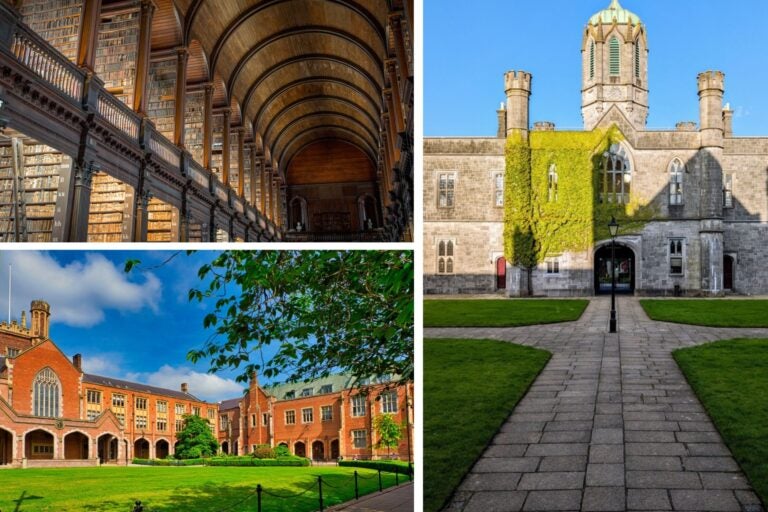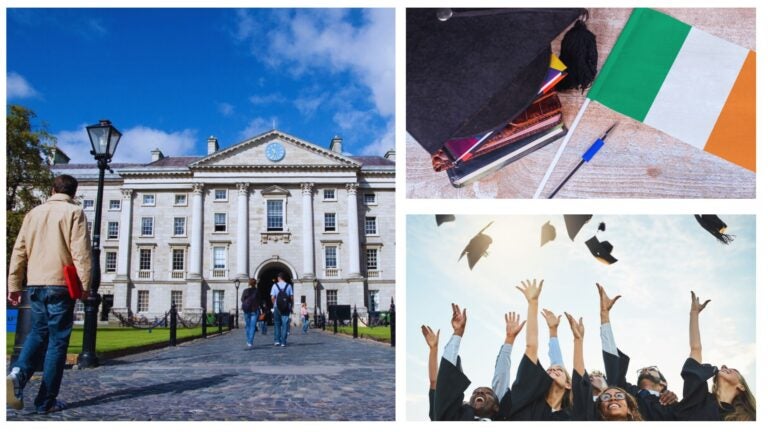Discover how to study in Ireland for international students
This is the guide to learn how to study in Ireland for international students. You are just one step away from achieving your dream!
If you’re looking to study in Ireland for international students, this guide has everything you need. We’ll walk you through how the education system works, requirements, top universities, visa options, ways to fund your studies, tuition fees, how to validate your qualifications, and how to apply to different courses.
Ireland is home to world-renowned educational institutions, and it also offers the chance to immerse yourself in a rich culture while learning or improving your English. So if you’re thinking about taking your academic journey abroad, don’t hesitate—what follows will help you turn your study plans in Ireland into reality.
How does the education system work in Ireland?
To understand how to study in Ireland as an international student, it’s important to first get familiar with how the Irish education system works. Known for its strong focus on research and innovation, the system includes universities, technological institutes, and specialized colleges—all overseen by Quality and Qualifications Ireland (QQI), which ensures the academic programs meet high standards. Here are the main levels of study you’ll find:
- Undergraduate programs: Depending on the chosen career, the duration is between three and four years with internships.
- Postgraduate programs: You can do a Master’s degree with a duration of one or two years or a Doctorate, which, being a research on a specific topic, can last up to three years.
Most degree programs in Ireland are taught in English, making it easier for international students to adapt. However, some institutions also offer courses in Irish as a way to preserve and promote the Gaelic language.
Requirements to study in Ireland for international students
To study at any institution in Ireland, you’ll need to meet a set of general requirements set by the Irish government. Later on, we’ll look at specific procedures for individual schools, as some may ask for extra documentation. But first, here are the main requirements:
- Student visa: If you are a student coming from a non-European Union country.
- Valid passport: Valid for the duration of the study program.
- Letter of Acceptance: Document that certifies the acceptance of an Irish educational institution.
- Proof of financial solvency: Proof of financial solvency is required to demonstrate that you can afford to pay for your entire stay and studies.
- Payment of tuition: You can submit proof of payment or scholarship application.
- Medical insurance: It is important to take out a medical policy to cover any emergency that may occur in the country.
- Proof of English language proficiency: Official certificate such as IELTS or TOEFL, depending on the requirements of the institution.
Steps to study in Ireland for international students
Here’s a step-by-step guide to help you figure out how to study in Ireland as an international student. We’ll walk you through choosing the right type of institution based on your goals, how to cover tuition—whether through funding or scholarships—and what you need to know about relocating and staying connected once you’re there. Let’s get started!
1. Evaluate universities and courses in Ireland
What do you want to study? That’s the first question you need to ask yourself—starting a full degree in Ireland, pursuing a PhD, or taking a short specialized course are very different paths.
It’s also important to consider factors like tuition costs, whether the qualification is officially recognized, and the language of instruction. To help you get a clearer picture, the table below highlights the key differences between university programs and short courses.
| Characteristics | University Programs | Short Courses |
| Duration | 3 – 4 years (undergraduate) / 1 – 2 years (postgraduate) | 3 – 12 months |
| Visa requirement | Necessary for long-term studies | If not longer than 90 days, no visa is required |
| Academic validity | University degree with international recognition | Certificate or diploma |
| Job opportunity | Access to work permits for students | Limited by duration |
| Prices | Higher, between $12,000-35,000 | Cheaper, between $2,000-8,000 |

2. Review financing options for studying in Ireland
Living in Ireland can be expensive, but the quality of life and services is also high. So, if you’re wondering how to study in Ireland for international students and manage the costs, here are some ways to make it more affordable:
- Scholarships: Financial aid programs are available for international students, such as the Erasmus + Scholarship or the one offered by Trinity College Dublin, with partial or full payment of tuition plus a monthly allowance.
- Student loans: Some financial institutions offer educational loans focused on students with low interest rates. You need to contact a bank specialized in foreigners and explain your personal situation.
- Sponsorships and aid programs: Depending on the country of origin, there may be financial support programs for students abroad.
3. Apply to a study program in Ireland
Once you’ve decided on the institution and program you want to apply for, the next step is to submit your application. Most schools allow you to do this online, making it easy to apply from your home country.
For example, one of the most recognized universities in the country, Trinity College Dublin (TCD), requires the following documents in order to apply to one of its programs:
- Application form: This can be done through their online platform or by contacting the CAO (Central Application Office).
- Academic certificates: All your degrees must be translated into English and with an accepted equivalence.
- English test: It must be official, such as IELTS with a minimum of 6.5 or the TOEFL equivalent.
- Cover letter: You must convince them of your interest in studying at this particular school and provide your academic references.
- Proof of payment: The application has a fee that must be paid and the proof of payment must be sent.
4. Apply for a visa to study in Ireland
If you’re from outside the European Union (EU) or the European Economic Area (EEA), you’ll need a student visa to enter and study in Ireland. To help you understand how to study in Ireland for international students requiring a visa, here are the key things you need to know.
The type of visa you’ll need depends on the length of your study program. For example, if your course lasts just a couple of weeks, a tourist visa might be enough. But for longer stays, you’ll need to apply for a student visa.
It can take anywhere from four to eight weeks to get your visa approved, and the application is done through the official Irish Immigration Service (INIS) website. These are the two main types of visas you can apply for:
- Tourist Visa (Short Stay ‘C’ Visa): Recommended for short courses of less than 90 days, it does not give you permission to work and it is not renewable.
- Student Visa (Long Stay ‘D’ Visa): For programs of more than three months, with permission to work part-time.
5. Moving to Ireland
Besides understanding how to study in Ireland as an international student, it’s also key to prepare for your move and adapt smoothly. Here are some local customs that might be quite different from what you’re used to:
| Concept | Details |
| Meal times | – Breakfast is usually between 7:00 AM and 9:00 AM. – Lunch is light and is taken between 12:00 AM and 2:00 PM. – Dinner is the main meal and is usually served between 6:00 PM and 8:00 PM. |
| Transport | In Dublin, the Luas streetcar system is the fastest and most efficient option. Monthly fares cost between $65-80. |
| Weather | It rains most of the time, it is advisable to wear waterproof clothing. |
| Accommodation | In Dublin the prices of an apartment are around $1,800-2,500. You can rent a coliving for students from $1,200. |
| Portals | To find housing for rent, visit websites such as Daft.i and Rent.i |
| Rental requirements | One or two months deposit, work contract, references and passport. |
6. Connectivity in Ireland
Staying connected while living abroad for your studies is essential—not just for comfort, but for peace of mind. Whether you need to send an urgent email, check your class schedule on campus, navigate around the city, or stay up to date with your professors’ announcements, reliable internet access will be your best ally.
One of the best ways to stay connected while abroad is by signing up to Holafly Plans. They offer coverage in over 170 destinations, easy setup through their app, and a range of subscription options to suit your needs.
| Subscription | Details | Tariff |
| 10 GB Plan | Designed for short trips or basic use where you don’t need to download as many documents. | $40.93 |
| 25 GB Plan | Plan Ideal for video calls, collaborative work and high file downloads. | $51.19 |
| Unlimited Plan | The best option to have no limits at all, ideal for remote workers and intensive internet users. | $67.90 |
Important: If you are a frequent traveler and want to stay connected without worrying about expensive roaming or looking for a new SIM at every destination, Holafly’s subscription plans are for you. With a single eSIM, enjoy internet in more than 170 countries for a fixed price and no surprises on your bill. Travel without limits and connect easily and securely! 🚀🌍

When and how to homologate degrees and courses in Ireland?
Another key aspect of studying in Ireland for international students is the recognition of your academic qualifications. If you’ve earned certifications abroad, you’ll likely need to have them officially recognized. To do this, you’ll need to go through NARIC Ireland via their official platform. Here’s how the process works:
- Short courses: Do not require homologation, but some institutions may ask for previous certifications.
- Degree programs (undergraduate): To access an Irish university with previous studies, the institution will ask for the equivalence of your high school diploma at a cost of between $80-150.
- Graduate programs: Your graduate degree from another university must be validated for acceptance into a degree program in Ireland.
- Regulated professions: If you wish to practice a regulated profession such as medicine, law, engineering or teaching, you must have your degree approved by the appropriate bodies at a cost of between $200-500.
How much does it cost to study abroad in Ireland?
It’s also essential to understand your monthly budget and manage your expenses comfortably. To help you plan ahead, we’ve put together a table summarizing the key costs you’ll need to cover:
| Cost | Prices |
| Undergraduate tuition | $12,000-25,000 |
| Master’s tuition | $10,000-35,000 |
| Doctoral tuition | $12,000-30,000 |
| Short courses | $2,000-8,000 |
| 1 bedroom apartment (Dublin) | $1,800-2,500 |
| Student transport pass | $65-80 |
| Supermarket (monthly food) | $250-400 |
| Utilities (internet, water, electricity) | $100-200 |

Study online in Ireland as a foreigner
Online education has become one of the most popular options—especially for international students—because it offers a more affordable way to study at a top university without the added cost of relocating.
That’s why many universities now offer some of their programs remotely, although the selection is still more limited compared to in-person options. There’s also a hybrid alternative, where most of the coursework is online but exams take place on campus. Let’s take a look at the pros and cons of each option:
| Aspect | Online study | Face-to-face study |
| Cost | Cheaper (without accommodation and transportation expenses) | More expensive (tuition + living in Ireland) |
| Flexibility | Flexible schedules, you can study from any country | Fixed schedules, face-to-face attendance required |
| Access to resources | Digital materials, access to recorded lectures | Access to physical libraries and academic events |
| Interaction with professors and classmates | Less interaction as it is virtual | Immersive experience and networking |
| Job opportunities | No work permit | You can work while you study |
Some of the universities where you can study online are:
- Trinity College Dublin (TCD): Online postgraduate programs in areas such as project management and digital health.
- University College Dublin (UCD): Online courses in business, law or data science.
- Dublin City University (DCU): Courses in technology, communication and education.
- The Open University Ireland: Online courses in business, technology and humanities.
Frequently asked questions on how to study in Ireland for international students
If you’re not from an EU country, you’ll need a student visa for any course lasting more than 90 days. However, for short-term programs under three months, a tourist visa will do.
You are only allowed to work part-time with a student visa, with a tourist visa it is forbidden.
It depends on the program and the institution, but most require an official certification such as IELTS (minimum 6.0-6.5) or TOEFL (minimum 80-90 points).
In Dublin, the safest neighborhoods for students are Ranelagh, Rathmines, Clontarf and Blackrock. While in Cork, you can stay in the Douglas and Ballintemple neighborhoods.
To stay ahead and avoid last-minute issues, it’s best to start the process a year in advance. Most Irish universities close their applications between January and March for courses that begin in September.





 Language
Language 


















 No results found
No results found



